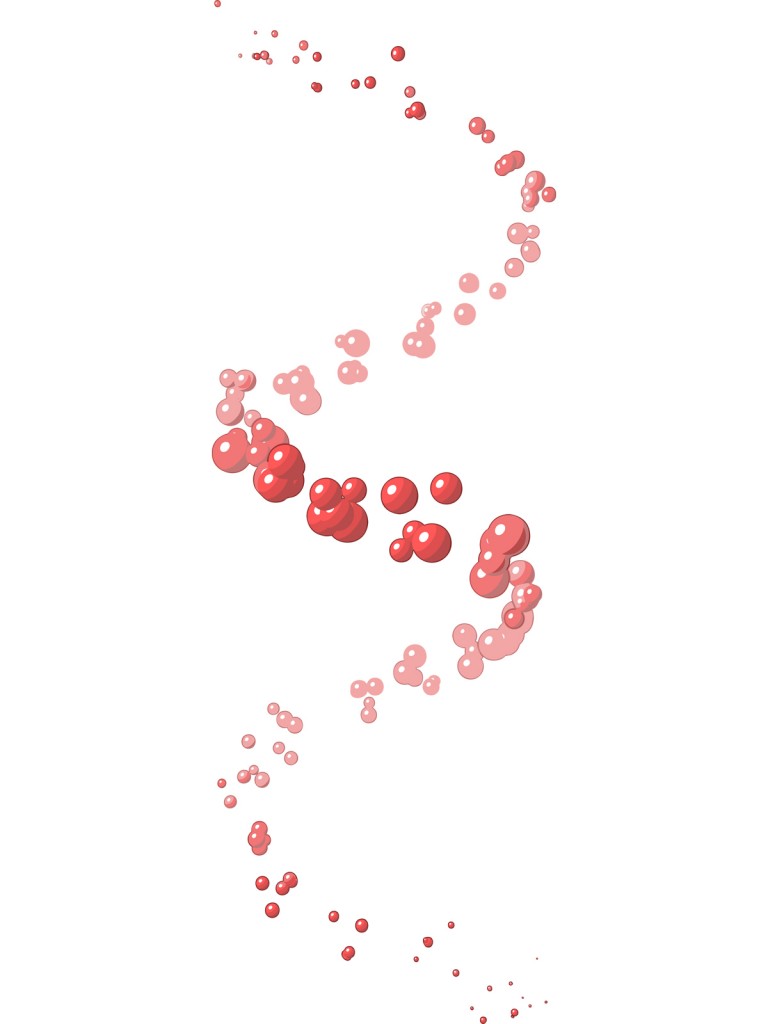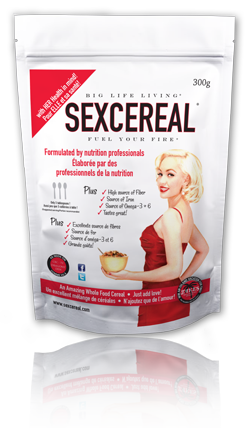What’s fueling your fire in the morning?
Let me guess: SEXCEREAL?!!
This ‘Big Functional Food’ would have slipped by with nary a thought had my friend David Svet not brought it to my attention. But he did and hence, I had to share it with you. After all, it’s Friday and time for some folly.
So, let’s talk about SEXCEREAL, shall we?
This product is not only “the first food product to go viral” (really? What about Life or Tang, which was viral for their time?), but, it is also a ‘gender-based cereal…created with sexual health in mind.’ Wow! It’s downright bodacious and bodylicious!!!
What’s in this amazing, nutritionally-formulated, quality-controlled bowl of desire?
- Maca
- Cocoa nibs
- Sunflower
- Chia seeds
- Almonds
- Flax seeds
- Oat bran
- Ginger
- Oats
Among all of these ingredients, only maca and cocoa have been scientifically studied for their effects on sexual desire. I’ve written previously about maca and the evidence, at least from scientific trials, is pretty scant. Chocolate, on the other hand, has long been considered an aphrodisiac. Yet, when it was studied in women specifically for its effects on scientific desire and pleasure, the data are not so clear; some women have self reported higher levels of desire after eating chocolate but when the data are scrutinized, these results don’t hold. The rest of the ingredients? Honestly, I am lost.
If cereal is your morning bag, you could eat worse; each serving of SEXCEREAL does dose up a nice bit of fiber and omega-3 fatty acids. It’s low in sodium too. But if you are looking for fire, you may want to look elsewhere. And if you are into eating your sex and having it too? Well, there are certainly much better solutions!
p.s. If you want a chuckle, check out the testimonials.… SEXCEREAL – “I love a cereal that goes all the way.” Bob from Saskatchewan
Happy Weekend!
Read More
NewsFlash! Can fish oil supplements help prevent skin cancer?
Omega-3s. When it comes to a buzz, it keeps growing louder and louder. And while I’ve observed the buzz between a reduction in skin cancer risk and fish oils for some time now, the studies showing positive benefit have been done in rats, which makes it difficult to apply findings to humans. That is, until now.
Researchers from the University of Manchester in England published a paper in the American Journal of Clinical Nutrition online this past January that explored the first study of omega-3s and skin cancer in humans. And while the study is small, it’s a first step towards what could possibly be very good news for many .
For context, UV radiation (UVR) causes the majority of non-melanoma skin cancers and the incidence of these cancers continues to rise in particular, among white and lighter skinned individuals. Researchers believe that sunlight suppresses the ability of cells and the immune system to fight off skin cancer and infection, therefore allowing them to proliferate and cause cancer. This is one reason that people with diseases that suppress the immune system are more prone to developing cancer. However, there is some evidence that diets that are rich in omega-3 fatty acids are associated with reduced risk of skin cancer, perhaps as a result of how they benefit immunity.
The study included 73 women between the ages of 18 and 60 who sunburned easily with no or very little ability to tan. These volunteers either took 4 g of omega-3s daily (70% EPA, 10% DHA) or a placebo pill for 12 weeks and were exposed daily to 8, 15 or 30 minutes of simulated sunlight (via a special light machine). The results? Among women exposed to sunlight for 8 or 15 minutes a day, taking omega three supplements appeared to shut down immune suppression by as much as 50%. However the greater the sun exposure, the less effect omega-3s had, as the researchers did not observed the same protection among women who had 30 minutes of sun exposure daily .
The researchers say that the findings are important because most people apply sunscreen inadequately and don’t wear it daily. So, boosting daily omega-3 intake may potentially help protect against skin cancer, so long as sun exposure is limited. Still, bear in mind that omega-3s are not replacements for sunscreen; rather, consider them part of your armor against cancer. Meanwhile, we need bigger studies to see if these initial findings can be borne out in larger numbers of people.
Stay tuned. Whatever you do, omega-3s are good for your heart and perhaps, for you skin as well!
Read MoreWednesday Bubble: It’s in the DNA, right?
 Aging, it’s in the DNA, right?
Aging, it’s in the DNA, right?
Actually, it’s a bit more complicated than that, but it appears that the length of your telomeres may be an important key.
Telo what?
Telomeres are little caps at the end of chromosomes that keep your genetic information intact and stable. In a sense, the body created telomeres to protect our genetic information and insure that it’s passed down to the next generation. Their gatekeepers are an enzyme called telemorase, and it insures telemere health. And while the length of our telemeres tend to shorten as we age, factors like health behavior, disease and exposure to internal inflammation and oxygen free radicals in the blood can also affect their length and stability, and promote illness that give aging a bad name in the first place.
Fortunately, it’s not all about genes. In fact, researchers now say that taking adequate amounts of omega-3 fatty acids may actually improve the odds.
Indeed, when researchers provided different doses of omega-3s (or placebo pills) to 106 healthy but sedentary middle aged men and women and asked them to take them daily for four months, they found that significant and beneficial changes in telomere length. The low down:
- Participants took 2.5 g daily or 1.25 gram daily of omega-3 fatty acids (in a ratio of 7:1 EPA/DHA since EPA has shown to have stronger anti-inflammatory effects than DHA) or placebo. The placebo contained a mixture of oils designed to mimic the amount of fats that US adults typically consume in a day.
- Both groups of people taking omega-3s showed significant declines in the amount of inflammation in their body.
- The ratio of omega 3 and omega 6 were important: in fact, the lower the ratio, the longer the telomeres.
The researchers say that on average, most Americans consume a diet of omega-3s in a ratio that’s skewed towards omega-6, which comes in the form of vegetable oils im most people’s diets. The average diet tends to be low in omega-3s, the fatty acids typically found in cold-water fish like salmon or mackerel. But when the average ratio of omega-6/omega-3s is lowered from about 15:1 to 4:1 or 2:1, there are benefits to be had. In this case, the benefits are in the form of longer telomeres and in turn, the potential to reduce the risk for age-related diseases.
In a related press release, study co-author Ron Glaser makes an analogy to shoelaces, explaining that short fragments of DNA, telomeres, act as caps at the end of chromosomes,much like the protective plastic at the end of a shoelace. “If that plastic comes off, the shoelace unravels and it doesn’t work anymore. In the same way, every time a cell divides, it loses a bit of its DNA at the ends and over time, can cause significant problems.”
The bottom line is pretty clear: change your omega-3 ratio and you may change your aging odds. Sounds like a win-win.
(This study appears in the advanced online edition of Brain, Behavior and Immunology).
Read More
Finding the ME in menopause. Guest post by Kelley Connors
Sometimes you meet a person and know instantly that s/he will be an influencer in your life, someone who shares a common interest and someone who can teach you a few important lessons. Kelley Connors is one of those people. I met Kelley at a conference last Fall and continue to be wowed by her contributions to women and their health. Thanks Kelley, for this great post!
The ME in menopause is a journey, or as best-selling author, Gail Sheehy, might say, a passage. Only there are distinct differences from that original publication back in 1976 when Ms. Sheehy was in her late 30’s, and first wrote about the midlife “crisis” as passage point.
Ms. Sheehy is the first to admit that the first book fell short on what would become the real midlife, as she had no idea of what 50 might look like herself in 1976, other than distinctly “old” images of her mother and father. (Since then Ms. Sheehy has written New Passages and Passages for Caregivers, inspiring many women like me to also share my “passage”.)
Things are different today, in 2012, as we now know that menopause is a time of estrogen-deficiency, and not a crisis at all, but a virtual gateway to the next 30-40 more years of life. It’s a time of awakening, of realizing our potential, and potentially a very free-ing time in our lives.
That’s how I’ve chosen to see this time in my life and I’d like to be one of the increasing numbers of “old” women, who might see 92 from the third seat in a scull, and rowing in a Master’s rowing event instead of succumbing to osteoporosis, one of my biggest risk factors.
So, with my vision for how I wanted to be at 92, I became more interested in creating a foundation for wellbeing, a pathway that would give me the tools for a positive mindset, a flexible and strong body, and the energy to be creative – all factors in assuring longevity. Research shows us that doing all we can do in our 50’s is critical to setting a foundation for living well through out our life – emotionally, physically and spiritually.
How I Have Reinvented Menopause (so far)
As I near menopause, I decided to take new steps – steps that I had previously not really considered important in my life.
Once I learned about how the physiological changes associated with estrogen loss, I decide to be more proactive in preserving my quality of life, and perhaps even gain strength, muscle mass and, the holy grail, fulfillment and happiness. One thing was motivating me for sure – I did not want to succumb to the conflicting and disingenuous advertising messages we’re bombarded with as we women age!
First, exercise for wellbeing. I made a decision to join a women’s rowing, or crew team. It was not a decision that was easy to make, as I’m not an early morning person, but, as I’ve come to appreciate, there’s nothing like rowing with like-minded women on calm waters – and, there’s no better way to start a hectic day than rowing at 7 am. The really great thing about rowing is that you have to learn to “recover” from each stroke, giving you the cardiovascular strength you need to row for at least 30 minutes and possibly, achieve your target heart rate for at least 20 minutes. Cardiovascular strength training such as rowing or bike riding, is good for your heart, and makes you feel better, giving you a sense of wellbeing. While you will probably loose weight, the sense of wellbeing will be motivation enough to continue your commitment to yourself. You might even be able to rid yourself of an anti-depressant prescription!
Second, take a proactive mindset instead of a reactive mindset around nutrition. One of the changes I made to my diet, as a result, was taking dietary supplements. New research shows that taking a multi-vitamin may not help us women live longer. However, there are several key dietary supplements that are recommended for menopausal women such as fish oil supplements ( Omega-3 fatty acids), Vitamin D and Calcium. Have you considered taking any of these supplements that are proven to help menopausal women?
Third, I created my first ME-Pause. This “ME-pause” was packaged in a not so neat bow, with no clear answer, no clinical trails, and, ironically, no obvious relationship to my health. My Me-Pause was a defining moment as I declared the death of my life as a run-on sentence. Taking time to pause, reflect, think and plan have become more important to me. Putting a comma in a sentence is a good thing.
My ME-Pause turned out to be a cultural expedition to a little known ancient civilization, the last Shangri-La and a Buddhist haven nestled in the Himalayan Mountains – Bhutan. A remote civilization with few roads and hundreds of temples, Bhutan measures its progress by Gross National Happiness – as opposed to GNP. As Buddhists, the Bhutanese believe happiness arises from causing happiness in others. It’s more than a fleeting feeling of joy, but a belief in the power of positive thoughts, simple acts of kindness and love that transform people, communities and our relationship to the world.
The overarching result of my two-week trip to Bhutan with my aunt remains significant in my life today. I’m looking at menopause as a glass half full, a time in my life that is just the beginning to finding and designing the second half of my life with renewed passions and interests. I’m seeing, for the first time, that I can create my own wellspring for living better .. and into old age..and just maybe, I’ll have that third seat in the scull with three other women rowing the calm waters of the early morning.
About the author…Kelley Connors, MPH, is a women’s wellness coach, marketer and advocate for women’s health. She is the founder of Real Women on Health and President and Chief Creative Officer for KC Health.
Read More
Does your mental energy need a boost?
Mental energy. That elusive construct that is defined by our mood and feelings of fatigue or energy, our motivation, determination and enthusiasms and our ability to sustain focus and attention. I don’t know about you but I find that my mental energy is not always optimum. Moreover, I am not surprised; between physical, work and life demands, I am often overworked, overextended and overstressed. Personally, I find that downtime, exercise and creative endeavors help to refuel and refresh. However, can foods do the same?,
According to researcher Michael C. Falk from the Life Sciences Research Center in Bethesda, MD, part of the challenge in determining whether or not certain substances can enhance mental energy is the diverse number of methods used to measure effect. So, a lack of proof of the benefit of a particular substance might be partially related to the method. Nevertheless, in a recent study, he and his colleagues identified the most widely studied substances in diet and supplements: Ginko biloba, ginseng, glucose and omega-3 fatty acids and examined how they might be impacting the different facets of mental energy.
The findings:
Ginkgo biloba Ginko has been used in Traditional Chinese Medicine (TCM) for centuries, mostly for age-related declines in cognition, dementia and for Alzheimer’s. Unfortunately, it hasn’t shown much promise in this regard, but some data suggest that it might have use in improving mood, boosting how quickly individuals process information, and even improve attention. Less clear, however, how much should be taken and in what form (i.e. supplement or extract) or the length of time before results are seen.
Ginseng Like Ginkgo, ginseng is another herb that is common to TCM, either alone or in combination with others. An important challenge when using ginseng for medicinal purposes is that it quality is highly variable, which is why, similar to other herbs, you need to look for standardized formulations. When it comes to mental energy, the verdict is still out and research studies are inconclusive. The question remains, however, whether or not this is due to the fact that claims that it boosts mental prowess are false or that the actual ginseng being studied is too varied in quality and the part of the plant from which study formulations are derived are inconsistent.
Glucose Sugar. Not only is it an essential energy source for the body but it is the brain’s primary energy source. And yet, the studies that have looked at the effects of glucose on brain function, memory or even mood are all over the map and according to researchers, not very well documented. So before you start in on the next sugar buzz, you might want to find another boost for your mood, fatigue or focus.
Omega-3 fatty acids I love fish oils. Researchers continue to study them because their utility is so broad, although the source of omega-3, dosage and ratio of EPA and DHA appear to be important factors in terms of mood (i.e. depression in particular) and mental energy. Overuse of fish oils can also impair the ability of blood to clot and depress overall immune functioning. Still, out of the dietary components that researchers studied, omega-3’s were by far the one most backed by clear data. Most recently, they’ve also been shown to help prevent stroke. In so far as mental energy goes, the researchers note that evidence suggests that fish oils may help delay or reduce cognitive decline in the elderly or improve verbal fluency. Less clear is whether this benefit is stronger if the they are taken earlier in life before cognitive decline. And of course, there is litte agreement on whether or not fish oils supplements convey the same benefits as obtaining the through dietary sources.
The upshot is that the evidence is scattered, inconclusive and downright shoddy in some areas. And mental energy might need more than certain foods to reach its optimum level. Personally, I’m going to stick with my current program to maintain the mental mojo. But I’m open to suggestions. What about you? How are you dealing with the overworked, overextended and overstressed paradigm?
Read More










